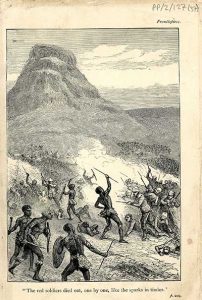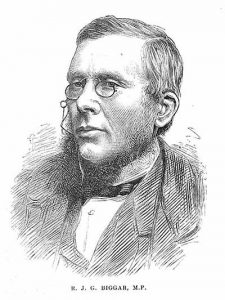On this Day
Published in Issue 1 (January/February 2018), News, Volume 26By AODHÁN CREALY
JANUARY
21–23/1879

Above: Scene from the Battle of Isandlwana, 22 January 1879, the British Army’s heaviest military defeat by the Zulus. (Maynooth University Library)
The Battle of Isandlwana/Rorke’s Drift. For many, the six-month Zulu War, prompted by the invasion of King Cetshwayo’s independent kingdom by British colonial forces under Lord Chelmsford, is viewed through the prism of the 1964 movie Zulu, which portrayed, with considerable artistic licence, the epic defence of a mission station—named after Irishman James Rorke, who had a trading store there— by c. 100 British troops (including a dozen or so Irishmen) against c. 3,000 Zulus. Thanks to Chelmsford, this strategically insignificant engagement was widely publicised. The bravery and self-sacrifice of the plucky Brits was applauded—no mention was made, of course, of their execution of c. 500 Zulu prisoners—and no less than eleven VCs were awarded (in contrast with one VC each for the 1944 D-Day landings and the entire Battle of Britain). All of this was designed by Chelmsford to distract British public attention from what had preceded it: the crushing defeat of his army at Isandlwana, with the loss of over 1,300 of his men, including many Irishmen, by the main c. 20,000-strong Zulu army, armed with spears and shields. While British gallantry was duly extolled (such as the heroic last stand of County Leitrim’s Col. Anthony Durnford and the valiant but fatal effort by Dubliner Lt. Nevill Coghill to retrieve his regiment’s colours), her historians are still trying to explain the defeat. Causes include the lack of screwdrivers to loosen the screws on the ammunition boxes. From a Zulu perspective, Isandlwana was a glorious victory—but a pyrrhic one. Cetshwayo knew that the British would regroup and re-invade, which they did. Superior numbers and technology prevailed, and by July, after six more battles, Zululand was entirely subjugated.
01/1958
The European Economic Community (EEC), latterly the European Union (EU), came into operation.
01/1968
Donagh MacDonagh (55), poet, dramatist and jurist, died.
06/1818
The General Post Office (GPO) on Sackville (O’Connell) Street, Dublin, designed by Francis Johnston, opened to the public.
07/1928
Francis Ball, historian, author notably of The Judges in Ireland, 1221–1921 (1926), an important source since the documents on which it was based were destroyed when the Public Record Office was blown up in 1922, died.
15/1988
Seán MacBride (83), lawyer, revolutionary and international jurist who was awarded the Nobel Peace Prize (1977), died.
20/1968
Sir Alfred Chester Beatty (92), American mining magnate, businessman, philanthropist, and the first person granted honorary Irish citizenship (1957), died.
20/2017
Donald John Trump (70), businessman and television personality, was inaugurated as 45th president of the USA.
23/1918
Major Robert Gregory (38), only son of Augusta, Lady Gregory, was shot down and killed by friendly fire on the Italian front whilst serving with the Royal Flying Corps.
28/1918
Lt.-Col. John McCrae (45), Canadian surgeon and poet, who composed In Flanders Field (05/1915), died of pneumonia in Boulogne.
30/1948
Mahatma Ghandi (78), India’s prophet of non-violence, was assassinated in his own garden in New Delhi by the Hindu extremist Nathuran Vinayak Godse.
30/1968
Vietnam War—the Tet Offensive. After declaring a truce over the seven-day Tet (lunar New Year) holiday, c. 70,000 Viet Cong troops launched surprise attacks on US and South Vietnam forces throughout South Vietnam.
FEBRUARY
19/1890

Above: Joseph Gillis Biggar, Home Rule MP for Cavan since 1874.
Joseph Gillis Biggar, Home Rule MP for Cavan since 1874, died. The Presbyterian pork butcher from Henry Street, Belfast, who taught C.S. Parnell the technique of parliamentary obstruction, is popularly remembered for his appearance (he was a diminutive hunchback) and for his ability to talk interminably on any subject in a rasping Belfast accent. Demonised by the British press as a cold-hearted rebel, his reputation, for some at least, was considerably enhanced late in his life by the celebrated Hyland v. Biggar breach-of-promise action of 1883. In late autumn 1881, with a warrant out for his arrest, Biggar escaped to Paris. An out-and-out philistine with no interest in the arts or culture, the City of Light did little for his spirits until one afternoon he attended a party at the home of Irishwoman Madame Rouyer. Amongst the other guests was Fanny Hyland, daughter of a former mayor of Kilkenny, and ‘wee Joe’ was bowled over. Within minutes he was in deep conversation with her, and a week later was offering her his hand and a share of his personal fortune of £20,000. Soon afterwards, however, realising that the government did not intend to execute the warrant against him, he returned to Ireland to rejoin the political fray. The next time he saw Fanny was in a London court. Despite little third-party corroboration for her story, and everything poised for an acquittal, Biggar insisted on going into the witness box himself and thereby lost the case. Though damages of £400 were awarded against him, the judge afterwards declared that he had never met a more frank and truthful witness.
01/1918
William Melville (67) from Sneem, Co. Kerry, head of Scotland Yard’s Special Branch and from 1909 first chief of the British Secret Service, died.
01/1968
The image of South Vietnam’s police chief General Loan summarily executing a captured Viet Cong suspect was widely circulated in the American press, shaking the American public’s confidence in their South Vietnamese allies.
02/1918
Patrick Donnelly (IPP) defeated Dr Patrick McCartan (Sinn Féin) in the Armagh South by-election.
03/1468
Johannes Gutenberg, German inventor of the printing press (1439), widely regarded as the most important invention of the second millennium, died.
4/1868
Constance Markievicz, née Gore Booth, revolutionary and Sinn Féin politician, born in London.
5/1918
The luxury liner SS Tuscania, en route from New Jersey to Liverpool with over 2,000 US servicemen, was torpedoed and sunk by a German Uboat 13km north of Rathlin Island. Around 210 servicemen and crew lost their lives.
06/1918
The Representation of the People Act gave the vote to all men over 21 and most women over 30 in the United Kingdom.
06/1958
A British European Airways aircraft bringing the Manchester United team home from Belgrade crashed on take-off at Munich airport. The 21 who died included team members, sports journalists and club officials.
06/1968
William Conor (c. 87), an artist renowned for his portrayals of working-class life in Ulster, died.
15/1928
H.H. (Herbert Henry) Asquith (76), Liberal prime minister (1908–16), died.
18/1948
John A. Costello (Fine Gael) was elected taoiseach in the first interparty government.
















